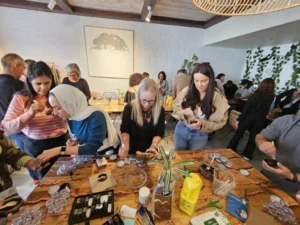Every day, we use soap, shampoo, or toothpaste—often without thinking twice. But what if those everyday items could help save the planet and support communities in need?
That’s the promise of sustainable personal care: products made with natural, ethically sourced ingredients and packaged in ways that are kinder to the environment. At Companies for Good, we believe sustainability shouldn’t feel like a distant ideal—it should be woven into our daily lives. That’s why we create hands-on experiences that show teams how simple, mindful choices can lead to meaningful change.
The global market for sustainable personal care products is expected to grow from $56.44 billion in 2025 to $90.40 billion by 2032, achieving a compound annual growth rate (CAGR) of 6.96% over that period.
This growth reflects a broader shift in consumer and corporate values toward sustainability and social responsibility. More individuals and companies want products that match their values about the environment and society. But there’s more to it than just the numbers—companies are realising that focusing on sustainability can also boost teamwork, help communities, and improve their business outcomes.
The Personal Care Industry’s Environmental Wake-Up Call
A recent report says that around 114 billion single-use beauty containers get thrown away each year, contributing significantly to environmental plastic pollution. Many regular products are packed with synthetic chemicals that can harm our skin and pollute water systems when they wash down the drain. Microplastics from scrubs end up in marine animals, and plastic tubes and bottles create mountains of non-biodegradable waste.
Switching to sustainable personal care isn’t just a trend; it’s something we really need to do. People are starting to realise that their daily routines impact the planet, and they’re looking for better options.
What Makes Personal Care Products Truly Sustainable?
Sustainable personal care goes beyond “eco-friendly” labels. Truly sustainable items include:
- Natural Ingredients: They use plant-based components that break down easily, swapping out harsh chemicals for gentler options like coconut oil, shea butter, and essential oils.
- Minimal Packaging: Think solid bars instead of liquid products in plastic bottles, compostable wraps, and refillable containers that reduce waste streams.
- Ethical Sourcing: Ingredients are sourced fairly, helping farming communities and being mindful of the environmental responsibility throughout the supply chain.
- Local Production: Reducing carbon footprints by sourcing materials locally and supporting regional economies.
Making Sustainable Care Products for Blue Collar Workers
Companies for Good created a meaningful CSR initiative that combined sustainability education with community support for female blue-collar workers in Dubai.

The teams got to make hands-on workshops creating natural personal care products, including lip balm, toothpaste, deodorant, pillow mist, scrubs, and soap using natural ingredients. Participants learnt sustainable product-making skills while personalising items with chosen scents and fragrances.
They packaged each item, placed them in paper bags, and decorated them with flowers and cards.
This sustainable teambuilding approach delivered multiple meaningful outcomes:
- Community Impact: The initiative directly supported immigrant women workers who often prioritise family needs over personal care, providing them with essential wellbeing items as tokens of appreciation.
- Environmental Awareness: Participants learnt about zero-waste practices and sustainable ingredient usage, promoting eco-friendly lifestyle changes within the company while preventing waste from reaching landfills.
- Social Responsibility: Teams gained deeper understanding of migrant worker challenges and contributed meaningfully to vulnerable community members through partnership with licensed local non-profits.
- Team Engagement: Colleagues collaborated on sustainable practices while developing practical DIY skills they could implement in their personal lives.
Companies for Good created this to show how CSR activities can really help the environment and social impact beyond traditional corporate boundaries.
Practical Steps Forward
Switching to sustainable personal care is easy and doesn’t mean you have to completely change your life. Just take it step by step:
- Swap out one product at a time: Try starting with soap or shampoo bars instead of liquid ones.
- Check the ingredient lists: Go for products that have simple, plant-based ingredients you can pronounce.
- Support local makers: Look for regional artisans creating handcrafted personal care items.
- Go for refillable options: Find brands that have refill programs or sell concentrates.
The Future is Sustainable
Switching to sustainable personal care isn’t just a trend—it’s something your team can get involved with. At Companies for Good, we help organisations create meaningful change through hands-on sustainability team-building experiences that benefit both your team and the community.
We offer programs like making natural personal care products and supporting local communities, turning eco-awareness into real actions. Ready to strengthen your team while making a positive impact?
Contact Companies for Good today to design your custom sustainability teambuilding experience.